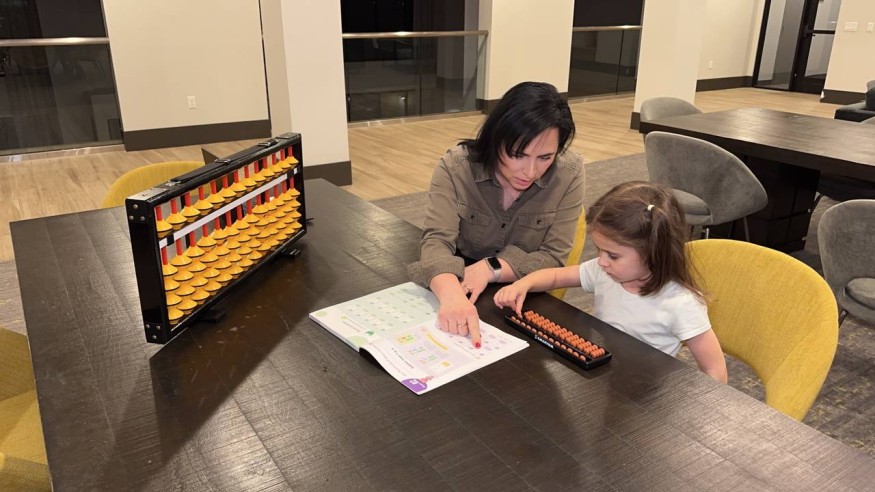Recent studies confirm the neuropsychological benefits of mental arithmetic. The method activates both hemispheres of the brain, improving memory, attention, and cognitive flexibility. This is especially important for children with special needs.
A real-life example: Larry Mullen Jr., the drummer of the band U2, shared about his dyslexia and dyscalculia, emphasizing the importance of understanding children's unique ways of processing information. His experience can serve as an inspiration for developing adapted teaching methods.
We discuss the achievements in this field with expert Natella Horodetska.

Natella Horodetska is an experienced educator with over 15 years of work in children's cognitive and intellectual development. With two Master's degrees in education and school leadership, she is also certified in the Montessori method in the U.S.
Originally from Kyiv, Ukraine, she has built a strong reputation in the field, founding several learning centers that focus on mental arithmetic and brain training. Her unique teaching techniques have helped students succeed in both national and international Olympiads.
Natella also created an online platform for mental arithmetic that's known for its accessibility and positive results in improving focus, memory, and processing skills, including for children with special needs.
Now living in Minnesota, she leads her company, Neuro Mental Math LLC, and regularly speaks at international conferences. She has published scholarly work and received the Queen Anna Order in recognition of her impact on education.
Recently, Natella was selected to serve as a jury member for the ECDMA Global Awards—a prominent international competition that celebrates innovation in e-commerce and digital marketing. Her appointment highlights her leadership at the intersection of educational innovation, inclusion, and digital transformation. Furthermore, Natella is the winner of the CatalyX Ventures 2025 Award. Additionally, she has received an American Business Expo Award, which celebrates individuals and organizations making significant strides across various industries through impactful results and innovative ideas. Natella was awarded in the "Inclusive Education" category.
Natella Horodetska — Winner of the International Online Mental Arithmetic Olympiad "VF CUP 2025"
In June 2025, Natella Horodetska—a recognized expert in children's cognitive development and founder of Neuro Mental Math LLC—proudly represented the United States at the "VF CUP 2025" International Online Mental Arithmetic Olympiad, one of the most prestigious global competitions in the field of intellectual and cognitive education.
The event brought together participants from dozens of countries, with the GURU level—the highest category of difficulty—presenting especially fierce competition. Under intense time pressure and rigorous standards, Natella demonstrated exceptional mental agility and strategic thinking, earning 2nd place worldwide and 1st place among all U.S. participants.
This achievement is not only a personal milestone but also a powerful testament to the effectiveness of Natella's proprietary teaching methodology, which she continues to develop and implement through her educational platform. Her success at the Olympiad reaffirms her international standing as a leader and innovator in the field of neuro-based pedagogy and mental arithmetic.

You are the founder of a new teaching methodology based on mental arithmetic and speed reading. Could you tell us more about how it all started? And how does this help children with special needs?
My educational journey began with classical pedagogy, but I soon realized that the main challenge in teaching isn't what you teach, but how you teach it. This is especially true for children with special needs. Their potential is much greater than commonly believed—they simply require a unique, tailored "language" of learning.
When I discovered mental arithmetic, I was struck by how it develops not only numerical skills, but also memory, attention, logic, fine motor skills, and even emotional intelligence. For me, it became more than just a teaching method—it was a true brain training approach at the neuropsychological level.
Over time, I studied how both hemispheres of the brain function and how neural connections form in children, including those with autism or ADHD. I found that using an abacus helps improve self-regulation and thinking processes. Similarly, speed reading isn't just about reading quickly—it's about cultivating deep focus and the ability to process large volumes of information efficiently and without stress.
What inspired me most was the realization that even seemingly simple techniques can radically transform a child's life—engaging them in the learning process, building self-confidence, and igniting a genuine passion for knowledge. This insight became the foundation of my own teaching methodology, a set of unique recommendations for teaching mental arithmetic to children with special needs, and the development of an innovative online tool, "Mental Math," an adapted system that supports a wide range of children, regardless of their starting abilities.
When we simultaneously activate both hemispheres of the brain, stimulate motor-sensory zones, and develop cognitive flexibility, a child begins to think faster, more confidently, and more deeply. They stop merely memorizing—they begin to think independently. That is the core distinction of my methodology.
What are the main benefits of mental arithmetic for children, in your view?
Mental arithmetic is much more than just the ability to calculate quickly in one's head. It's a comprehensive neuropsychological brain training that develops key cognitive and behavioral skills essential for both learning and everyday life. I would highlight several main benefits.
First, it promotes the simultaneous engagement of both hemispheres of the brain. When working with an abacus, children actively use the left hemisphere (analysis, logic) and the right hemisphere (visual thinking, imagination). This interhemispheric interaction boosts thinking speed and fosters cognitive flexibility.
Second, it enhances memory, concentration, and attention. Mental arithmetic requires children to constantly retain intermediate calculations and visual representations of operations in their minds. This significantly strengthens both working and short-term memory, while also training sustained and shifting attention.
Third, it improves fine motor skills and visual-motor coordination. Physically operating the abacus—moving the beads with fingers—stimulates brain areas responsible for speech and writing. This is especially beneficial for children with fine motor difficulties, dysgraphia, or sensory processing challenges.
Fourth, it helps build stress resilience and self-regulation. During lessons, children learn to work under time constraints, follow specific algorithms, and cope with mistakes—all within a playful, competitive framework. This develops emotional stability, self-control, and confidence.
I must also highlight the versatility of this method. My approach has proven effective for both high-achieving children and those with neurodivergent profiles such as ADHD, autism spectrum disorder, or learning differences. Mental arithmetic can be adapted to each child's unique needs, allowing them to progress at their own pace.
And finally, I'd like to emphasize how motivation to learn naturally increases. Fast, visible results, competitive elements, and digital tools all help children believe in themselves. This, in turn, sparks intrinsic motivation for learning and growth.
As an expert, my ultimate goal isn't just to teach a child to calculate faster—it's to unlock their
mental and emotional potential. And mental arithmetic is exactly the kind of tool that can do so effectively, safely, and inspiringly.
How does speed reading affect overall academic performance and information processing in children?
Speed reading is not just about "reading faster." It's about how efficiently the brain processes, structures, and retains information. Proper speed reading instruction involves training attention, memory, logical thinking, and the ability to identify key points. That's why speed reading has a comprehensive impact on a child's overall academic performance.
First, it develops both sustained and dynamic attention. Unlike traditional reading, where attention can easily drift, speed reading requires full concentration. This helps children not only read but also engage deeply with the meaning of the text, retain plot lines, and quickly locate important information.
Second, it speeds up visual information processing. In today's world, children face information overload—at school and online. Speed reading teaches them not to get stuck in details but to take in large volumes systematically, filter out the essential, and think critically.
Third, it improves memory and vocabulary. The more a child reads, the faster their vocabulary expands, literacy improves, and language skills develop. This directly impacts academic performance across all subjects—literature, history, biology, and even math—by strengthening their ability to quickly understand and interpret problem statements.
What's especially important is that the speed reading techniques I use are adapted for children with developmental differences. These methods help build the skill of internal focus—something often lacking in traditional educational settings.
As a result, the child doesn't just read faster—they learn to think differently: to generalize, analyze, and remember. And that means learning becomes easier and more enjoyable.
© 2026 ScienceTimes.com All rights reserved. Do not reproduce without permission. The window to the world of Science Times.











